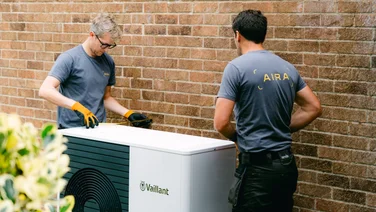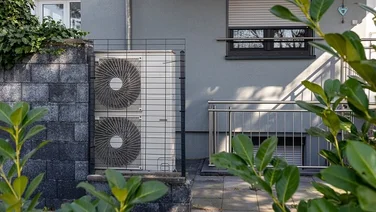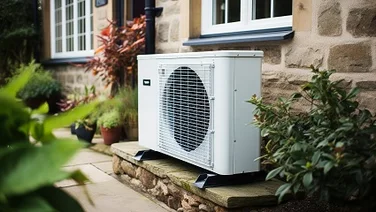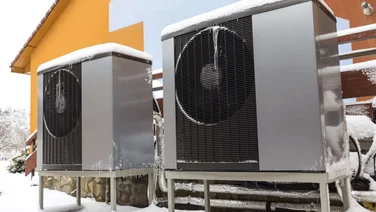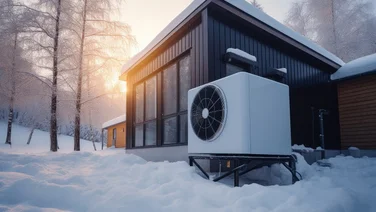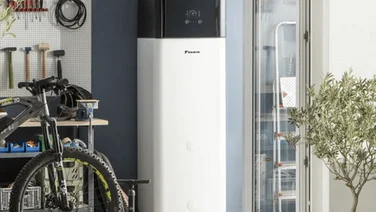We receive a small fee from trusted installers when you request a quote through our site. This helps us keep our content independent, well-researched and up to date – Learn more
- A heat pump is a highly efficient home heating system
- The most common types in the UK are air-source and ground-source heat pumps
- Heat pumps cost anywhere from £1,600 to £35,000+, depending on the type

Want to cut your energy bills and lower your carbon footprint? Heat pumps are more than 300% efficient, meaning it provides three units of energy for every one it consumes, and with the £7,500 Boiler Upgrade Scheme, getting one installed has never been easier (or more affordable).
If that sounds interesting, use our quick comparison tool to get free quotes from trusted installers and see how much you could save.
What type of central heating do you currently use?
Get startedWhat is a heat pump?
In short, a heat pump is a machine that pumps heat from one source (air, ground or water) to another, such as the air inside your home or water systems such as your central heating or hot water systems.
It achieves this using a special liquid called a refrigerant ( just like your fridge) that either heats or cools a space by compressing or expanding the liquid.
If you want to know how much a heat pump will set you back, take a look at our heat pump cost calculator.
These systems are typically reversible as well, meaning they can ‘pump’ the heat from your home to the outside, to create an air conditioner.

Heat pumps work like a fridge in reverse. The outdoor unit (like the one in the picture) does most of the hard work, while smaller indoor units handle heating or cooling the rooms. The technology is tried and tested, but it’s still pretty rare to see heat pumps used for heating homes in the UK.
They are very common on the continent and in the US. Heat pumps are powered by electricity and have very high efficiency in turning fuel (electricity) into heating or cooling, typically in the 100s of percent. For this reason, they are a great way to help cut down energy bills.
Heat pumps tend to come in one of four main types:
- Air-source heat pumps (or air-to-air heat pumps) draw heat from the outside air and use it to heat your home. They can do this at temperatures as low as -25°C, although they typically work harder when temperatures go below freezing. You would need a separate system to heat water for bathrooms, such as a heat pump water heater.
- Air-to-air heat pumps can also be used for air conditioning, since they can switch from hot air to cool air.

- Ground-source heat pumps draw heat from the ground through a loop or borehole system buried in the land surrounding the home. When it’s 0°C outside, the ground temperature usually stays at a comfortable 10°C, which makes ground-source heat pumps more efficient in winter than air-source heat pumps. You’ll need a fair amount of outdoor space to install these systems.
- Water-source heat pumps draw heat from a nearby water source, such as a pond, lake or river. They’re the most efficient type of heat pump because water transfers heat effectively and usually stays warmer than the air and the ground in winter.

For specifics on the different types of heat pumps, visit our full guide.
What type of central heating do you currently use?
Get startedHow are air-, ground- and water-source heat pumps different?
The basic process of using a refrigerant to pump heat from one area to another is the same for all types, but they differ dramatically in how they do this.
- Air-Source Heat Pumps: Extract heat from the outside air, even in cold weather. They are the most common and easy to install but can be less efficient in extremely cold climates.
- Ground-Source (Geothermal) Heat Pumps: Use heat from the ground, where temperatures remain more consistent year-round. They are more efficient than air-source but require more space and higher installation costs.
- Water-Source Heat Pumps: Extract heat from a nearby water source, like a lake, river, or well. They are efficient but depend on having a suitable water source nearby.
| Type of Heat Pump | Installation Complexity | Average Costs | Efficiency |
|---|---|---|---|
| Air-source | Relatively easy; can be installed on exterior walls or rooftops | £1,600-£15,000 (depending on size and climate) | Moderate to high; less efficient in very cold weather |
| Ground-source | Complex; requires underground piping, more space and excavation | £16,200-£35,000+ (higher upfront cost due to excavation) | Very high; stable ground temperatures improve efficiency |
| Water-source | Moderate; requires access to a water source such as a lake, well or river | £6,000-£11,000 (depends on water source proximity and system size) | High; efficient but dependent on the temperature and availability of water source |
How efficient are heat pumps?
Heat pumps often boast efficiencies over 250%. This is because they don’t generate heat, they move it. Extracting heat from the air, ground or water can transfer more energy than they consume, so their performance seems to exceed 100%.
Instead of traditional efficiency, heat pumps are rated using the Coefficient of Performance (COP) and Seasonal Performance Factor (SPF). COP is a momentary measure (like 3.5 = 350%), while SPF shows how well the system performs over an entire heating season.
Cooling-capable units also utilize the energy efficiency ratio (EER) or the seasonal energy efficiency ratio (SEER) to measure their energy efficiency. EER is an instant reading, while SEER gives a more practical, seasonal average.
How does a heat pump work?
- In heating mode, a heat pump extracts heat from the outside air, ground or water and transfers it indoors.
- It absorbs this heat using a liquid refrigerant in sealed pipes, which becomes a gas.
- This gaseous refrigerant is then compressed, increasing its temperature (similar to what happens at the back of a fridge).
- The hot gas then passes through a heat exchanger, transferring heat to the home’s heating system and hot water supply.
- After the heat is released, the gas cools, condenses into a liquid and repeats the cycle (much like how a fridge cools your food).
- The heat extraction method depends on the type of heat pump (air source, ground source or water source).

Different types of heat pumps extract heat from different outside sources (air, the ground, water), but once they have it, they more or less function the same way.
All heat pumps, except air-to-air heat pumps, are designed to work as part of a ‘wet heat system.’ This means they heat water (indirectly), which flows to radiators throughout the house.
Air-to-air heat pumps operate as part of a ‘dry heat system,’ which means they heat air sent to rooms in the house through vents or ducts.
Crucially, all heat pumps are powered by electricity. They don’t use electricity to generate heat, as an electric radiator does – they use it to power the systems that extract and transfer heat.
How much does a heat pump cost?
Heat pumps cost from around £1,600 to £35,000+, depending on their size and the type of heat pump.
Air-source heat pumps cost £7,000 for an average two-bedroom house and up to £15,000 for a five-bedroom house. Water-source heat pumps are in a similar price range.
Ground-source heat pumps are more expensive, costing from £17,000 to more than £35,000.
| Property size | Two-bedroom | Three-bedroom | Four-bedroom | Five-bedroom |
|---|---|---|---|---|
| Air-source heat pump size | 4kW | 5kW | 10kW | 16kW |
| Air-source heat pump cost | £7,000 | £10,000 | £13,000 | £15,000 |
| Ground-source heat pump size | 4kW | 8kW | 11kW | 13kW |
| Ground-source heat pump cost | £17,000 | £24,000 | £30,000 | £35,000 |
These costs are representative and don’t reflect exactly what you’ll pay. Heat pump installations are always priced on a case-by-case basis. Our ground-source heat pump pricing is based on a horizontal installation with trenches.
Running costs for a ground-source heat pump for a three-bedroom household typically cost around £800 or more annually.
The average air-source heat pump will cost about the same, though this can vary significantly, depending on where you live in the UK.
| Heating method | Efficiency (%) | Annual energy use (kWh) | Cost (p/kWh) | Annual bill |
|---|---|---|---|---|
| Gas boiler | 95 | 11,500 | 6.99 | £804 |
| Heat pump | 300 | 3,833 | 27.03 | £1,036 |
| Oil boiler | 92 | 11,875 | 8.7 | £1,033 |
| Electric boiler | 100 | 10,925 | 27.03 | £2,953 |
Energy price data courtesy of Ofgem. These costs are illustrative and don’t reflect exactly what you’ll pay.
Are there grants for heat pumps?
Yes, there are several grants for heat pumps.
The government’s Boiler Upgrade Scheme is the main grant for heat pumps. It will reduce the cost of air-, ground- or water-source heat pumps by up to £7,500.
This means an air-source heat pump will cost the average homeowner £2,500 instead of £10,000, which is cheaper than a gas boiler.
There are other heat pump grants for low-income families, including the nationwide ECO4 Scheme, Nest in Wales and Warmer Homes Scotland in Scotland.
How many homes in the UK have heat pumps?
Around 250,000 heat pumps have been installed in the UK by August 2024, with installations rising steadily yearly. The UK government aims to hit 600,000 installs annually by 2028 and cut gas boiler use by 80% by 2035.
Despite this push, only half of UK residents are aware of heat pumps, even as they grow in popularity. They offer a way to future-proof homes with renewable energy while lowering energy bills.
Globally, adoption is surging, too, with air-source heat pump purchases in North America, Europe and northern Asia expected to triple by 2025. By 2030, nearly a quarter of homes in those regions will have one.
Summary
- Heat pumps are a clean, efficient way to heat (and cool) your home using energy from the air, ground or water.
- They can deliver more heat than the electricity they consume, often with efficiencies above 250%.
- The UK government offers grants up to £7,500 to help cover installation costs, making heat pumps more affordable than ever.
- Air-source heat pumps are the most common and easiest to install, while ground- and water-source models offer higher efficiency.
- Despite growing adoption, many UK homeowners are still unaware of how much they could save with a heat pump.
- With installations set to surge across the UK and globally, now’s the perfect time to explore your options and get free quotes.


